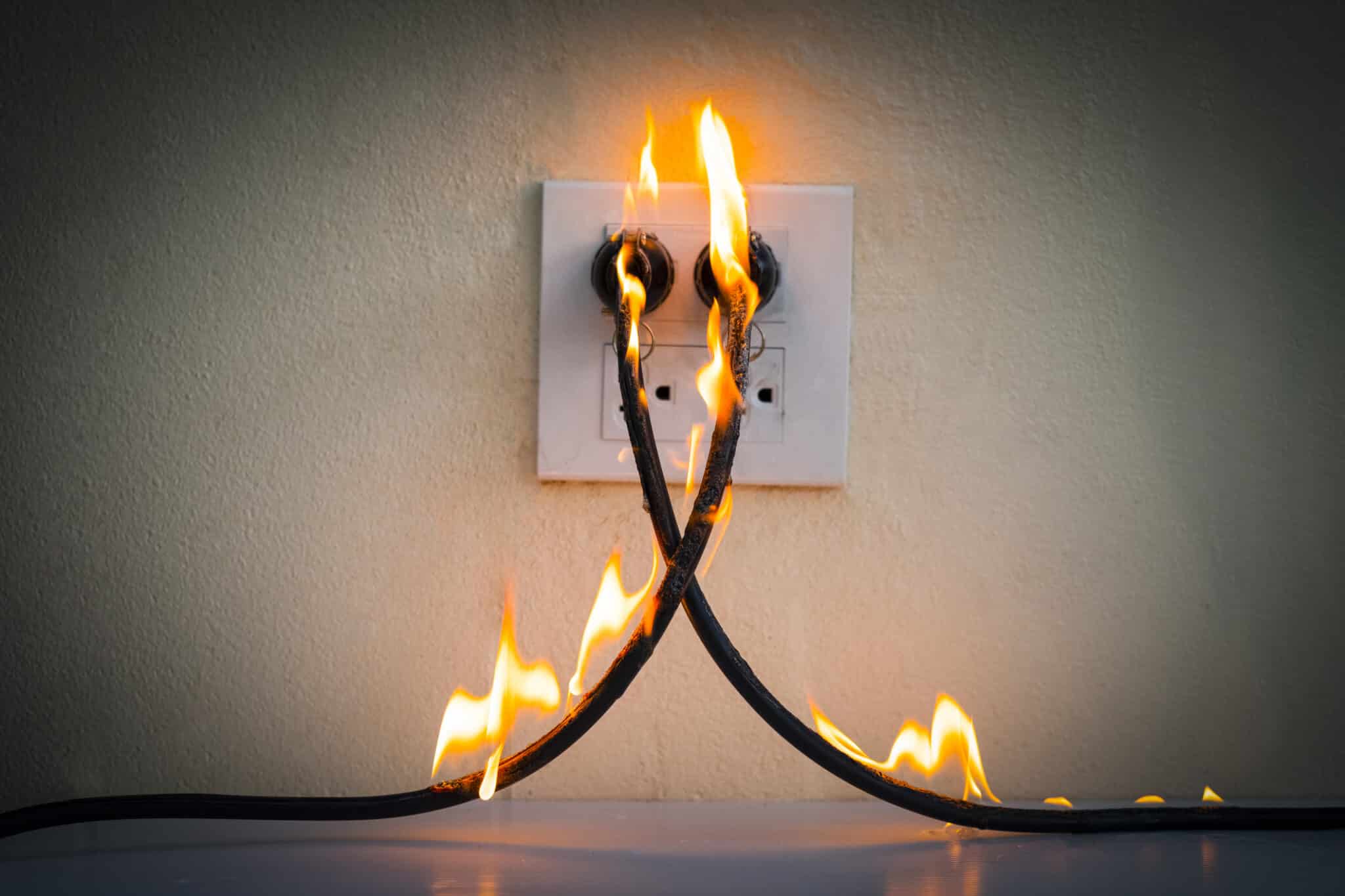Electrical Overloads – Have you ever noticed your lights flickering or your circuit breaker tripping frequently? These are common signs of electrical overloads, a problem that many homeowners in Charleston, Mt. Pleasant, and Summerville faces.
Understanding electrical overloads and how to prevent them can save you from potential hazards and costly repairs. Let’s dive into what electrical overloads are, their causes, and how you can keep your home safe.
Understanding Electrical Overloads
Electrical overloads occur when more electrical demand is placed on a circuit than it can handle. Think of it as trying to fit too many people into a small car—it just can’t manage the load. When multiple devices draw power simultaneously from the same circuit, the wires can overheat, leading to potential hazards.
An electrical overload can happen in various situations, such as plugging too many high-wattage appliances into a single outlet or using extension cords as permanent solutions.
These scenarios push the circuit beyond its safe operating capacity, causing the wires to overheat. This overheating can damage the insulation around the wires, potentially causing sparks and even fires.
Electrical overloads might initially seem like minor inconveniences, often presenting as flickering lights or tripped circuit breakers.
Signs of an Electrical Overloads
Flickering Lights
This could be the sign of an electrical overload. When too many devices are plugged in and running at the same time, your electrical system struggles to keep up, causing your lights to flicker.
It’s not just an annoying problem; it indicates that your wiring can’t handle the load. Addressing this early can prevent more serious electrical issues down the line.
Frequent Circuit Breaker Trips
Circuit breakers are designed to cut off the flow of electricity when the system becomes overloaded, preventing damage and potential fires.
If this happens often, it’s a clear sign that you’re dealing with an electrical overload. Ignoring this can lead to damaged appliances and increased risk of electrical fires. Make sure to spread out your electrical usage and possibly upgrade your system if necessary.
Warm or Discolored Wall Plates
Touching a warm wall plate or seeing discoloration around your outlets is a warning sign. When circuits are overloaded, they can generate excess heat, which can cause wall plates to become warm or even discolored.
This is a serious issue that needs immediate attention to avoid potential fire hazards. Overheated wiring can melt insulation and create dangerous conditions. Call a professional to inspect and resolve the issue promptly.
Potential Dangers of Electrical Overloads
Fire Hazards
Electrical overloads can pose serious fire hazards. When too much electricity flows through your wiring, it can cause overheating and sparks, which may ignite surrounding materials.
This is particularly dangerous in older homes with outdated wiring. Preventing overloads by distributing electrical loads and upgrading your system can significantly reduce the risk of fire. Always be proactive in addressing electrical issues to ensure your home remains safe.
Damage to Appliances and Devices
An electrical overload can wreak havoc on your appliances and devices. Excessive voltage can cause components to burn out or short circuit, leading to costly repairs or replacements.
Devices like computers, TVs, and kitchen appliances are particularly vulnerable. To protect your investments, ensure your electrical system is up to date and properly maintained. Consider using surge protectors to safeguard sensitive electronics from power surges.
Increased Risk of Electrical Shocks
Overloaded circuits increase the risk of electrical shocks. When wiring overheats, it can degrade insulation, exposing live wires and creating dangerous conditions. This is especially concerning if you have young children or pets at home.
Regular maintenance and timely upgrades of your electrical system can help prevent these hazards. Always prioritize safety and consult a professional electrician for any concerns.
How to Prevent Electrical Overloads
Distribute Appliances Across Multiple Circuits
One of the easiest ways to prevent electrical overloads is by distributing your appliances across multiple circuits. Avoid plugging too many high-wattage devices into a single outlet or circuit.
Spread out your electrical load by using different outlets in different rooms. This simple step can help balance the load and prevent your circuits from becoming overloaded.
It also ensures that your devices receive consistent power without causing strain on your electrical system.
Avoid Using Extension Cords for Permanent Solutions
Extension cords are handy for temporary use, but they shouldn’t be used as permanent solutions. Relying on them too much can lead to overloaded circuits and potential fire hazards.
Instead, install additional outlets where needed to accommodate your electrical needs. This not only prevents overloads but also keeps your home safer.
If you find yourself frequently needing extension cords, it’s a sign that your electrical system needs an upgrade.
Upgrade Your Electrical System if Necessary
If your home frequently experiences electrical overloads, it might be time to upgrade your electrical system. Older homes, in particular, may not be equipped to handle modern electrical demands.
Upgrading your wiring, circuit breakers, and overall electrical capacity can prevent overloads and improve safety.
Consult a licensed electrician to assess your current system and recommend necessary upgrades. Investing in your electrical infrastructure ensures a safer and more efficient home.
Proper Use of Electrical Appliances
Avoid Overloading Power Strips
Power strips are convenient, but they can easily become overloaded. Plugging too many devices into a single power strip can cause it to overheat and potentially start a fire.
Always check the power strip’s capacity and ensure you don’t exceed it. Spread your devices across multiple outlets to balance the load. By doing so, you maintain the safety and efficiency of your electrical system.
Turn Off Unused Appliances
Turning off appliances when they are not in use is a simple yet effective way to prevent electrical overloads. Appliances left on can continue to draw power, contributing to the overall load on your circuits.
Make it a habit to turn off and unplug devices like toasters, coffee makers, and chargers when they’re not needed. This not only reduces the risk of overloads but also saves energy and lowers your electricity bill.
Follow Manufacturer Instructions
Always follow the manufacturer’s instructions for using and maintaining your electrical appliances. These guidelines are designed to ensure safe and efficient operation. Ignoring them can lead to improper usage and increase the risk of overloading your circuits.
If an appliance comes with specific power requirements or safety tips, be sure to adhere to them. Proper usage extends the life of your appliances and keeps your electrical system running smoothly.
Electrical Safety Tips
Keeping your home safe from electrical hazards is essential. Here are some key tips to ensure your electrical system is secure and efficient.
Regular Inspection of Electrical Systems
Conducting regular inspections of your electrical systems is crucial for maintaining safety. Over time, wiring and other components can degrade or become damaged.
- Schedule periodic checks: with a professional electrician to identify and fix issues before they become major problems.
- Ensure your system is up to code: and functioning properly with regular inspections.
- Proactive maintenance: helps prevent electrical overloads and other hazards.
By staying proactive with inspections, you can avoid costly repairs and ensure a safe home environment.

Professional Maintenance and Upgrades
When it comes to electrical systems, professional maintenance and upgrades are essential. DIY fixes can be dangerous and often don’t address the root cause of the problem.
- Hire a licensed electrician: to ensure all work is done safely and correctly.
- Receive valuable advice: on necessary upgrades, such as installing additional circuits or updating outdated wiring.
- Professional services: help keep your home safe and efficient.
Investing in professional maintenance and upgrades ensures long-term safety and functionality for your electrical system.
Childproofing Electrical Outlets
If you have young children, childproofing your electrical outlets is a must. Curious little ones can easily stick objects into outlets, risking electrical shocks.
- Use outlet covers: or tamper-resistant receptacles to prevent accidents.
- Simple devices: are easy to install and provide an extra layer of safety.
- Childproofing your home: helps protect your family from potential electrical dangers.
By taking these simple steps, you can create a safer environment for your children and give yourself peace of mind.
Upgrading Your Home’s Electrical Capacity
Assessing Your Current Electrical Load
Before making any upgrades, it’s important to assess your current electrical load. This helps determine if your system can handle your household’s power needs. Identify high-wattage appliances and how often they are used.
Check the capacity of your circuit breakers and wiring. Consulting with a licensed electrician to get an accurate assessment is crucial. Knowing your current electrical load is the first step in planning an effective upgrade.
Planning for Future Needs
Planning for future electrical needs ensures your home can accommodate additional devices and appliances without issues. Consider upcoming additions like home offices, new appliances, or entertainment systems.
Account for potential increases in power usage, such as electric vehicles or smart home devices. Creating a long-term plan with your electrician helps avoid frequent upgrades. Being proactive about future needs maintains a safe and efficient electrical system.
Hiring a Licensed Electrician
Hiring a licensed electrician is crucial for safely upgrading your electrical system. They have the expertise to handle complex tasks and ensure everything is up to code.
Choose a qualified professional with experience in residential electrical systems. Ensuring all work meets local regulations and safety standards is essential.
Receiving expert advice on the best solutions for your home guarantees that your upgrades are done correctly and safely.
Using Circuit Breakers and Fuses Correctly
Understanding Your Home’s Circuit Breaker Panel
Knowing which circuit controls which part of your home can help you quickly address issues. Take time to label each circuit accurately.
Familiarize yourself with the panel’s layout and the location of the main switch. Regularly check for signs of wear and tear to prevent problems.
Replacing Blown Fuses Safely
Replacing blown fuses safely is important to prevent electrical hazards. First, make sure to turn off the main power supply to avoid electric shocks. Use the correct type and rating of fuse to match your electrical system.
Insert the new fuse carefully and ensure it’s seated properly. If fuses blow frequently, it might be a sign of a bigger issue that needs professional attention.
Resetting Tripped Circuit Breakers
Tripped circuit breakers are a common occurrence and resetting them properly ensures your electrical system remains safe. First, turn off all connected appliances to prevent power surges.
Locate the tripped breaker in the panel—it will be in the “off” position. Flip the breaker to the “on” position firmly. If the breaker trips again immediately, consult an electrician to diagnose and fix the underlying problem.
Investing in Energy-Efficient Appliances
Investing in energy-efficient appliances is a smart move for both your wallet and the environment. Here’s why they are beneficial and how they can reduce your electrical load.
Benefits of Energy-Efficient Appliances
Energy-efficient appliances offer numerous benefits:
- Lower Energy Bills: They use less power, saving on electricity costs.
- Longer Lifespans: These appliances last longer, reducing the need for replacements.
- Environmental Benefits: They reduce greenhouse gas emissions, contributing to a healthier planet.
- Improved Efficiency: Designed to perform better while using less power.
- Increased Home Value: Attractive to potential buyers.
By investing in energy-efficient appliances, you not only save money but also contribute to a healthier planet. These benefits make energy-efficient appliances a worthwhile investment for any homeowner.
How They Reduce Electrical Load
Energy-efficient appliances are designed to use less power without compromising performance. This means they put less strain on your electrical system, helping to prevent overloads.
For example, an energy-efficient refrigerator uses advanced technology to keep your food cold using less electricity. Similarly, LED lighting uses a fraction of the power of traditional bulbs while providing the same amount of light.
Installing Surge Protectors
Installing surge protectors is crucial for safeguarding your home’s electrical devices. Here’s what you need to know about the different types.
Types of Surge Protectors
There are several types of surge protectors designed to meet different needs. Choosing the right one helps protect your home and devices effectively.
- Point-of-use surge protectors: Protect individual devices like computers and TVs.
- Whole-house surge protectors: Installed at the main electrical panel for broad protection against external surges.
- Specialized surge protectors: Guard phone lines, cable lines, and Ethernet connections.
Selecting the right type ensures your home’s electrical safety and protects your valuable electronics from damage.
Where to Install Surge Protectors
Strategic placement of surge protectors maximizes their effectiveness. Point-of-use surge protectors should be placed near valuable electronics like home entertainment systems, computers, and kitchen appliances.
For comprehensive protection, consider installing a whole-house surge protector at the main electrical panel.
This provides a first line of defense against power surges from outside sources, such as lightning strikes or utility company issues. Ensuring proper placement is key to effective surge protection.
Maintenance of Surge Protectors
Maintaining your surge protectors ensures they continue to protect your devices effectively. Regularly check the status indicators on your surge protectors to ensure they are functioning properly.
Replace any surge protectors that show signs of wear or damage. It’s also a good idea to test your surge protectors periodically by using a surge protection tester.
Proper maintenance helps extend the life of your devices and keeps your home’s electrical system safe.
Importance of Professional Electrical Services
When to Call an Electrician
Knowing when to call an electrician can save you from potential hazards and costly repairs. Call a professional if you experience frequent circuit breaker trips, flickering lights, or warm outlets.
If you notice burning smells or see sparks coming from your outlets, it’s essential to get immediate help. Electrical work, such as installing new circuits or upgrading your panel, should always be handled by a licensed electrician.
Choosing the Right Electrical Service Provider
Choosing the right electrical service provider is crucial for the safety and reliability of your home’s electrical system.
Look for a licensed and insured electrician with a good reputation in your community. Ask for recommendations from friends or read online reviews to find a trustworthy service provider.
Ensure Your Home’s Safety with Mister Sparky of Charleston
Are you experiencing electrical overloads in Charleston, Mt. Pleasant, or Summerville? Trust the experts at Mister Sparky of Charleston to keep your home safe and efficient.
Our professional electricians are ready to handle all your electrical needs, from inspections to upgrades.
Don’t wait until it’s too late—contact us today at 843-588-1912 and ensure your home’s electrical system is in top shape!

FAQ
How can I tell if my home is at risk of electrical overloads?
Look for frequent circuit breaker trips, flickering lights, and warm or discolored wall plates. If you notice these signs, have a licensed electrician inspect your system.
What should I do if I suspect an electrical overload?
Unplug unnecessary devices and spread out the load across different circuits. Contact a licensed electrician for a thorough assessment and solution.
How often should I have my electrical system inspected?
It’s important to inspect your system every 3 to 5 years, or more frequently if you live in an older home or notice signs of electrical overloads. Regular inspections ensure safety and compliance, preventing electrical overloads.
Can energy-efficient appliances reduce my risk of electrical overloads?
Yes, energy-efficient appliances use less electricity, reducing the overall load on your system and helping prevent electrical overloads.
What are the benefits of installing surge protectors in my home?
Surge protectors prevent damage to your appliances and electronics from power surges, which can occur due to electrical overloads, extending their lifespan and ensuring safety.









